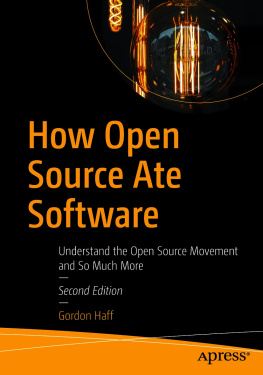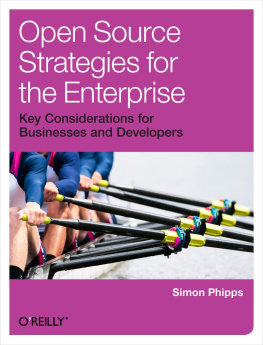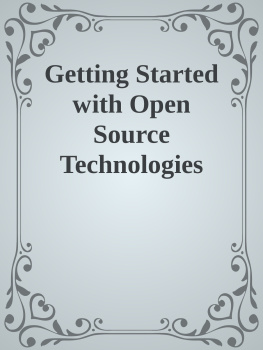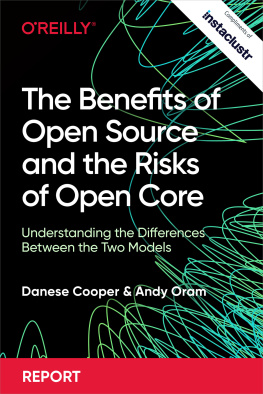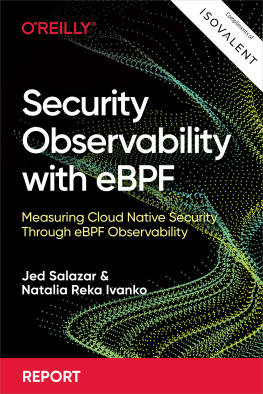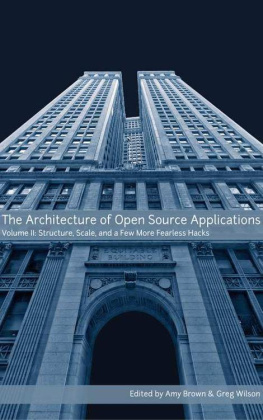Gordon Haff - How Open Source Ate Software: Understand the Open Source Movement and So Much More
Here you can read online Gordon Haff - How Open Source Ate Software: Understand the Open Source Movement and So Much More full text of the book (entire story) in english for free. Download pdf and epub, get meaning, cover and reviews about this ebook. publisher: Apress, genre: Politics. Description of the work, (preface) as well as reviews are available. Best literature library LitArk.com created for fans of good reading and offers a wide selection of genres:
Romance novel
Science fiction
Adventure
Detective
Science
History
Home and family
Prose
Art
Politics
Computer
Non-fiction
Religion
Business
Children
Humor
Choose a favorite category and find really read worthwhile books. Enjoy immersion in the world of imagination, feel the emotions of the characters or learn something new for yourself, make an fascinating discovery.
- Book:How Open Source Ate Software: Understand the Open Source Movement and So Much More
- Author:
- Publisher:Apress
- Genre:
- Rating:4 / 5
- Favourites:Add to favourites
- Your mark:
- 80
- 1
- 2
- 3
- 4
- 5
How Open Source Ate Software: Understand the Open Source Movement and So Much More: summary, description and annotation
We offer to read an annotation, description, summary or preface (depends on what the author of the book "How Open Source Ate Software: Understand the Open Source Movement and So Much More" wrote himself). If you haven't found the necessary information about the book — write in the comments, we will try to find it.
Gordon Haff: author's other books
Who wrote How Open Source Ate Software: Understand the Open Source Movement and So Much More? Find out the surname, the name of the author of the book and a list of all author's works by series.
How Open Source Ate Software: Understand the Open Source Movement and So Much More — read online for free the complete book (whole text) full work
Below is the text of the book, divided by pages. System saving the place of the last page read, allows you to conveniently read the book "How Open Source Ate Software: Understand the Open Source Movement and So Much More" online for free, without having to search again every time where you left off. Put a bookmark, and you can go to the page where you finished reading at any time.
Font size:
Interval:
Bookmark:
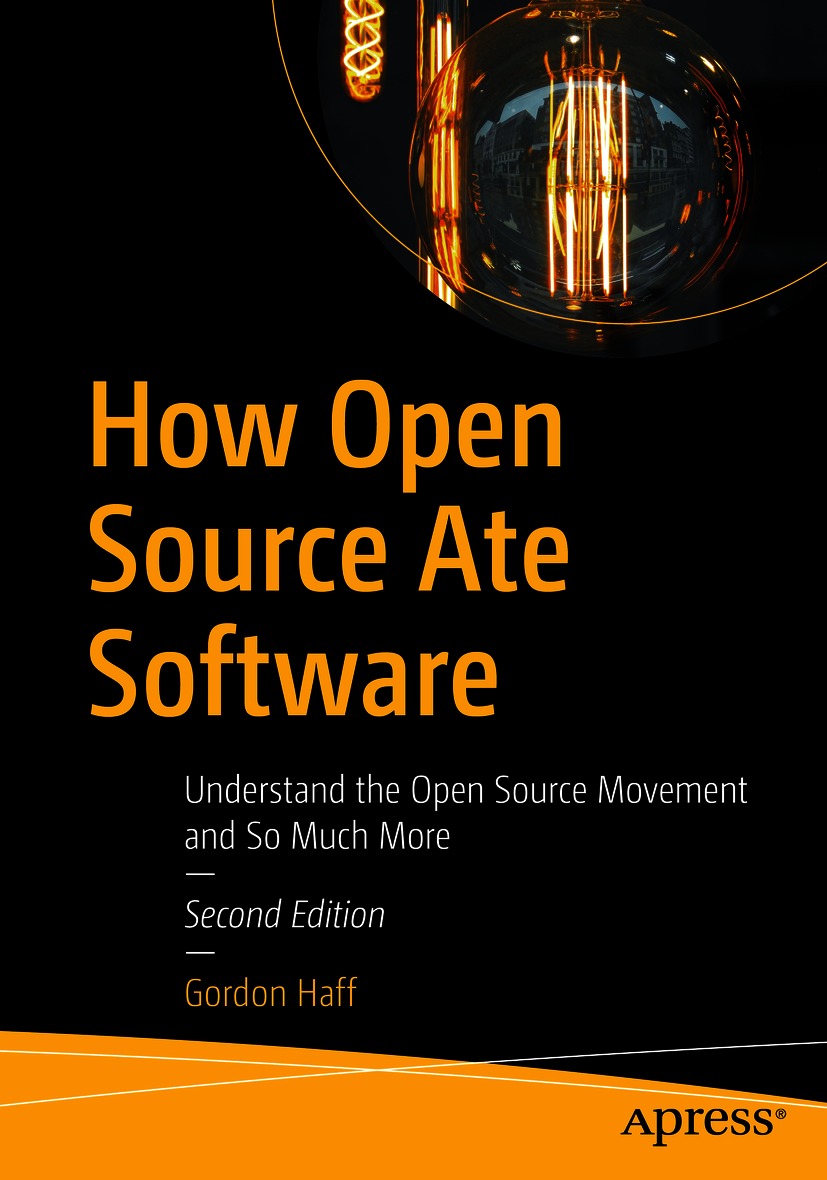

Any source code or other supplementary material referenced by the author in this book is available to readers on GitHub via the books product page, located at www.apress.com/9781484267998 . For more detailed information, please visit http://www.apress.com/source-code .
To my dad.
Information wants to be free. Users in control. I have rights to the code I depend on. Thats one way to view free and open source software.
Those are important things. Software freedoms matter. But its a lens that highlights open source as largely a personal movement that was probably never to have a truly widespread impact so long as it remained so constrained.
But open source also has practical applications relating to how software gets developed and used. Its part of an evolution in how individuals and organizations cooperatively innovate. Thats why open source, and open more broadly, is a topic worth serious attention.
Open source software as we know it today arose in a time and place when and where norms that had once prioritized sharing were giving way to a more proprietary and closed computer industry. Open source software helped to change that, and, in so doing, it illuminated processes for creating software that were better and not just preferable for mostly abstract reasons relating to software freedom.
Open source became an integral part of a world transitioning from traditional industrial structures and embedding software into more and more of its fabric.
This second edition provides you with the context to understand the historical forces that shaped open source including the legal framework within which open source operates then and now. While something vaguely like open source software may well have been inevitable, the form it took and the concerns that it tackled grew out of specific events and market dynamics. But many of those events lie far in the past, and the market landscape looks much different. Will open source software start to wither in such a changed world? Or, conversely, can its lessons be applied to broader questions of collaboration and culture that go far beyond computer source code?
In the course of asking questions such as these, I explain how open source works from community, development, and business perspectives through the eyes and words of both practitioners and researchers. I delve into the differences between community projects and commercial products. I share current thinking about project governance and community health. I highlight research that informs our understanding of why developers and others contribute to open source and how contributors can be best encouraged and nurtured. One of the big changes that open source software has seen is a shift from a primary focus on individual user freedoms to one that takes a broader view. What are the best ways of developing software? How can users best access software innovation and flexibly make use of software in the context of their specific business needs? How can they use open source and open sourceinspired processes to adapt to a faster-paced and more digital world?
This book examines the challenges facing open source given that some of the conditions that gave rise to it no longer apply. Business models built on open source software have never been easy, but todays market landscape including, not least of all, the major public cloud providers creates new obstacles to monetization and sustainability. I take a look at some paths to navigate around those obstacles including some of the new licensing approaches that attempt tobut mostly dontaddress business model challenges using that particular tool.
Its perhaps a reflection of the rapid evolution of open source software and open source principles that this second edition has added so much new content. Theres the revisiting of licenses as a business license tool, however mostly ill-directed. On the other hand, weve also seen a newfound recognition that trademarks may be useful as part of a legal toolkit for supporting business models based on open source development. I also delve into open governance and community management practices that have started to be more systematically laid out just within the past few years. The contrast between projects and products has also assumed outsized importance of late, especially in light of the ascendance of DevSecOps, an increasingly hostile threat landscape, and new open sourcebased security tools related to machine learning and trusted execution environments.
Beyond software is more of a mixed bag. Some areas, like open education, havent advanced much with online education, for example, having largely failed to live up to its initial hype. (Remote pandemic learning has only served to illustrate the challenges of distance teaching.) At the same time, in the open hardware area, RISC-V is showing considerable potential as a serious hardware architecture that is truly open.
But beyond software, open source approaches are taking root in data, hardware, education, and organizations more broadly. Not everything is transparent and open, nor can it realistically be. Business models depend on unique capabilities and knowledge. However, open source software both reflects and informs trends and practices that are becoming increasingly important and pervasive in business and elsewhere. Understand how open source came to be and how it works, and youll be closer to understanding how to innovate through working together with others in the modern world.
Font size:
Interval:
Bookmark:
Similar books «How Open Source Ate Software: Understand the Open Source Movement and So Much More»
Look at similar books to How Open Source Ate Software: Understand the Open Source Movement and So Much More. We have selected literature similar in name and meaning in the hope of providing readers with more options to find new, interesting, not yet read works.
Discussion, reviews of the book How Open Source Ate Software: Understand the Open Source Movement and So Much More and just readers' own opinions. Leave your comments, write what you think about the work, its meaning or the main characters. Specify what exactly you liked and what you didn't like, and why you think so.

